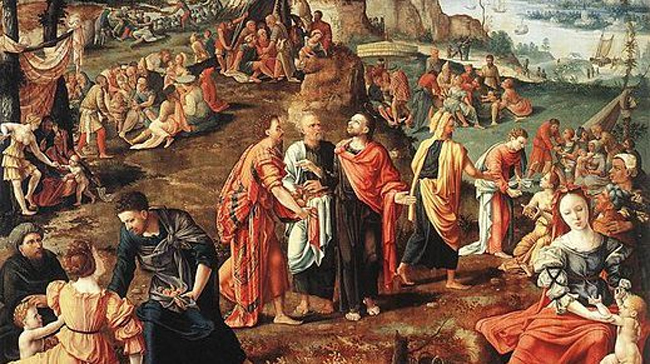Christian Art | Jesus Christ The King
Office Of Readings | Week 33, Saturday, Ordinary Time | A Reading From The Conferences Of Saint Thomas Aquinas | I Shall Be Satisfied When Your Glory Is Seen
‘I shall be satisfied when your glory is seen.’
Saint Thomas Aquinas reflects on the final words of the Creed—life everlasting—and treats them not as an abstract topic but as the culmination of Christian desire. His account begins by situating eternal life within the relationship between God and the human person. God is not merely the giver of a reward; God is the reward. The end of human striving is not a state, nor even a place, but union with the living God. Aquinas therefore frames eternal life as a participation in God’s own life, achieved through a direct vision that surpasses all earthly knowing.
This vision is described as the transition from mediated perception to immediate encounter. In the present life, knowledge of God is filtered through signs, sacraments, and the limitations of the human mind. This is what Paul calls seeing ‘in a mirror, dimly’. Eternal life, however, is the moment when this mediation falls away, and the blessed see God ‘face to face’. This vision does not merely inform; it fulfils. It is both the perfection of the intellect and the transformation of desire.
Aquinas then outlines a series of characteristics that flow from this union. Eternal life is marked by perfect praise. This is not the result of external command but the natural expression of a creature who finally beholds the source of all goodness. Joy and thanksgiving arise from a direct awareness of God’s glory. Praise in heaven is thus not episodic but continuous, grounded in an unchanging vision.
He also speaks of the complete satisfaction of desire. Human longing in this life is marked by incompleteness. Even legitimate goods—knowledge, friendship, beauty—remain finite and therefore cannot meet the full measure of human appetite. Aquinas emphasises that only the infinite good can satisfy infinite desire. Eternal life, then, is not the end of desiring but the end of frustrated desire. The blessed do not become passive; rather, their longing is met, enlarged, and stabilised in God.
Finally, Aquinas considers the communal dimension of heavenly life. The blessed form a fellowship characterised by mutual love, in which each person rejoices in the good of the other. Because love causes another’s good to be experienced as one’s own, the joy of each is multiplied by the joy of all. This shared delight is not competitive or diminished by number; it is collective and ever-increasing. Eternal life therefore includes both perfect union with God and harmonious communion with all who share that vision.
The reading encourages the faithful to interpret present longing, labour, and partial knowledge in light of what we anticipate. The desire for God—already active in faith—is the beginning of what will be completed in the vision of glory.

A Reading From The Conferences Of Saint Thomas Aquinas | I Shall Be Satisfied When Your Glory Is Seen
It is fitting that the end of all our desires, namely eternal life, coincides with the words at the end of the creed, ‘Life everlasting. Amen.’
The first point about eternal life is that man is united with God. For God himself is the reward and end of all our labours. I am your protector and your supreme reward. This union consists in seeing perfectly: At present we are looking at a confused reflection in a mirror, but then we shall see face to face.
Next it consists in perfect praise, according to the words of the prophet: Joy and happiness will be found in it, thanksgiving and words of praise.
It also consists in the complete satisfaction of desire, for there the blessed will be given more than they wanted or hoped for. The reason is that in this life no one can fulfil his longing, nor can any creature satisfy man’s desire. Only God satisfies, he infinitely exceeds all other pleasures. That is why man can rest in nothing but God. As Augustine says: You have made us for yourself, Lord, and our heart can find no rest until it rests in you.
Since in their heavenly home the saints will possess God completely, obviously their longing will be satisfied, and their glory will be even greater.
That is why the Lord says: Enter in the joy of your Lord. Augustine adds: The fullness of joy will enter into joy. I shall be satisfied when your glory is seen, and again: He who satisfies your desire with good things.
Whatever is delightful is there in superabundance. If delights are sought, there is supreme and most perfect delight. It is said of God, the supreme good: Boundless delights are in your right hand.
Again, eternal life consists of the joyous community of all the blessed, a community of supreme delight, since everyone will share all that is good with all the blessed. Everyone will love everyone else as himself, and therefore will rejoice in another’s good as in his own. So it follows that the happiness and joy of each grows in proportion to the joy of all.
Christian Prayer With Jesus
O God,
who alone can satisfy the longing you have placed within the human heart,
draw us ever more deeply into the mystery of your life.
Grant that we may desire what leads to you,
seek what unites us with you,
and rest only in the joy that you prepare for your saints.
Form in us a steady hope for the vision of your glory,
and strengthen us in the love that rejoices in the good of all.
Through Christ our Lord.
Amen.
Glossary Of Christian Terms
Beatific Vision
The direct, unmediated sight of God promised to the blessed in heaven. Described as the final fulfilment of human desire.
Communion of Saints
The fellowship uniting the faithful on earth, the souls in purgatory, and the saints in heaven.
Consummation
The final completion of God’s purpose for creation at the end of time, when all is brought to fulfilment in Christ.
Contemplation
A form of prayer in which the mind and heart rest in the presence of God, beyond words and images.
Desire of God
The inner orientation of the human heart that seeks its fulfilment in God alone.
Eschatology
Teaching that concerns the final destiny of the human person and of creation: death, judgement, heaven, and hell.
Eternal Life
Participation in the life of God, begun now in grace and completed in heaven.
Glory
The radiance of God’s own life and presence; in the saints, the reflected splendour of divine grace.
Heavenly Homeland
A traditional expression for eternal life, emphasising the pilgrim nature of earthly existence.
Hope
A theological virtue through which the believer trusts God’s promises and looks toward their fulfilment.
Rest in God
The spiritual peace found only in union with God, the source and end of all desire.
Sanctification
The work of the Holy Spirit by which a believer is made holy and conformed to Christ.
Supreme Good
A traditional term for God as the final and perfect object of human desire.








